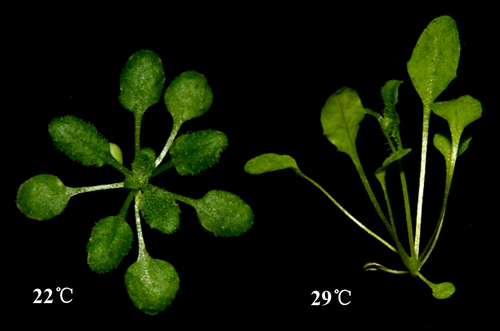-
Scientists Discover the Molecular Mechanisms Underlying High Temperature-induced Plant Adaptation Growth
TIME: 05 Apr 2012Higher plants adapt their growth to high temperature by a dramatic change in plant architecture. It has been shown that the transcriptional regulator phytochrome-interacting factor 4 (PIF4) and the phytohormone auxin are involved in the regulation of high temperature-induced hypocotyl elongation in Arabidopsis. However, the molecular linkage between PIF4 and the auxin pathway in this process remains elusive.
Scientists in Dr. Chuanyou Li’s group from the Institute of Genetics and Developmental Biology, the Chinese Academy of Sciences found that PIF4 regulates high temperature-induced hypocotyl elongation through direct activation of the auxin biosynthetic gene YUCCA8 (YUC8). PIF4-dependency of high temperature-mediated induction of YUC8 expression as well as auxin biosynthesis, together with the finding that overexpression of PIF4 leads to increased expression of YUC8 and elevated free IAA levels in planta, suggests a possibility that PIF4 directly activates YUC8 expression. Gel shift and chromatin immunoprecipitation experiments demonstrate that PIF4 associates with the G-box-containing promoter region of YUC8. Transient expression assays in Nicotiana benthamiana leaves support that PIF4 directly activates YUC8 expression in vivo. Furthermore, they show that the yuc8 mutation can largely suppress the long-hypocotyl phenotype of PIF4-overexpression plants and also can reduce high temperature-induced hypocotyl elongation. Genetic analyses reveal that the shy2-2 mutation, which harbors a stabilized mutant form of the IAA3 protein and therefore is defective in high temperature-induced hypocotyl elongation, largely suppresses the long-hypocotyl phenotype of PIF4-overexpression plants. Together, these results illuminate a molecular framework by which the PIF4 transcriptional regulator integrates its action into the auxin pathway through activating the expression of specific auxin biosynthetic gene. This study advances people’s understanding on the molecular mechanism underlying high temperature-induced adaptation in plant architecture.
This work with Dr. Jiaqiang Sun and Ph.D. Student Linlin Qi as the co-first authors has been published in PLoS Genetics (DOI: 10.1371/journal.pgen.1002594). This research was supported by grants from the National Natural Science Foundation of China and Ministry of Science and Technology.
AUTHOR CONTACT:
Chuanyou Li, Ph.D.
Institute of Genetics and Developmental Biology, Chinese Academy of Sciences, Beijing, China.
E-mail: cyli@genetics.ac.cn

(Image by Sun Jiaqiang and Li Chuanyou.)
Figure. Photograph showing 21-day-old wild-type (Col-0) Arabidopsis plants grown at 22℃ (left) and 29℃ (right), respectively. Our results establish a direct connection between temperature and auxin pathway through PIF4-mediated activation of YUC8 transcription in regulating high temperature-induced adaptation growth.
 CAS
CAS
 中文
中文




.png)
